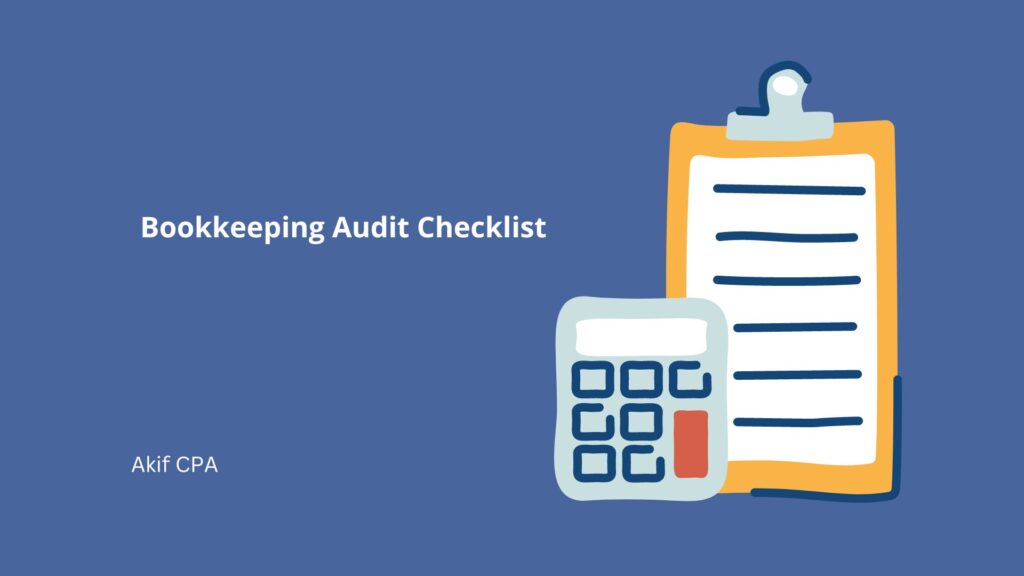It’s always a good idea to conduct random audits of your company’s financial books to make sure that your company’s data is stored in the right manner and in the right accounts.
Not only it helps you to maintain accuracy in your financial data, but also helps you to be regulatory compliant when you are faced with an audit by the IRS.
To keep your data accurate, we have mentioned a checklist to maintain while conducting an audit of your financial books.
Why Do You Need a Bookkeeping Audit Checklist
Bookkeeping audit checklists help you with a smooth financial audit process. The IRS lawfully requires auditing both public and private firms. Therefore, if you maintain an efficient bookkeeping system, it will help you:
- Avoid the risk of fraudulent practices in a company
- Ensure that your financial statements comply with state standards and regulations
- Help you make informed decisions that will you to optimize operations
In the coming section, let’s review some of the checks to maintain on your financial books:

Review Payroll Processes & Record-Keeping
Payroll audits can be subject to many errors because when a company hires new staff or fires old employees, it needs to update its chart of accounts and update the information in the payroll system.
It helps companies to make proper payments to their current employees at the right time.
This is why we audit the payroll records on a regular basis to ensure that everyone was paid during the time they were on the payroll roster.
Other things to keep in mind during payroll bookkeeping and payroll audit could be:
- Check each employee’s pay distribution against the rate of pay in the payroll ledger to ensure the accuracy of payment.
- Verify that hourly employees accurately recorded their working hours for the applicable period.
- Review the payroll ledger accounts to ensure that they reflect accurate payment information.
- Match each check to the corresponding transaction listed in the ledger, including paychecks, withholding, insurance, and taxes.
- Make sure that the employees are properly categorized. Falsely categorizing your employees may result in penalties by the IRS.
More details on the payroll by the IRS.
There may be a number of other regulations as well that govern your payroll, consult a qualified CPA to know more details.
Review Bank Reconciliation
Bank reconciliation should be considered one of the important checklists while conducting a bookkeeping audit.
You have to check the bank statement for any reconciling items, such as unpaid checks or incoming deposits, and make sure they are accurately entered into the accounting software for the business.
Furthermore, you have to verify that any differences between the bank statement and the general ledger are looked into and fixed as soon as possible.
The consequences of manipulating accounts could lead to possible jail time. A healthcare services company called HealthSouth was involved in financial fraud that entailed falsifying bank reconciliations.
In order to boost earnings and conceal expenses, the company’s CEO and CFO faked bank statements and reconciliations. After some time, they got exposed and the company’s executives were charged with crimes.
Petty Cash Verification
It is crucial to carefully check the petty cash transaction history in order to find potential theft. Verifying that the petty cash reconciliation correctly accounts for all funds is also essential.
Since petty cash is the most vulnerable account in a small firm, it’s critical to check that the register balance and cash balance match.
For instance, in the past, there have been numerous cases in which people authorized petty cash for their personal use. In 2018, a Catholic nun was found to have stolen over $800,000 in petty cash from the school funds.
The nun had been making unlawful purchases and withdrawals from the petty cash account for a number of years. Upon the discovery of the nun’s action, several charges were imposed on him.
Make sure that all calculations must be accurate, and that each transaction in the register is accompanied by a receipt.
Reviewing Expense Transactions
Examining expense transactions can help detect and prevent fraud. This includes identifying unauthorized expenses, duplicate payments, and suspicious transactions.
One of the most famous expense capitalization frauds is the WorldCom fraud. Not only the company faced huge monetary penalties, but several executives were charged as well.
You can review your expense transactions by validating the expense ledger accounts which can ensure that each transaction is posted accurately.
This will also help you gain insights into your spending patterns and trends which can help you forecast future expenditures.
Bank Statement Analysis
The auditor verifies the transactions in the bank statements and the transactions in the ledger by doing a bank statement analysis. They can use this to check for errors and ensure that all transactions have been accurately recorded.
All kinds of invoices should correspond with the bank statement entries. Bank statement analysis can also be used by auditors to confirm that the business is meeting its financial commitments, such as tax payments and banking rules.
Some of the major advantages of bank statement analysis include:
- Detect and prevent fraud and errors
- Helps identify a company’s financial position
- Helps in tax preparation and audits
- Prediction of future cash spending
Conclusion
In this article, we tried to make you aware of the consequences of false or inefficient bookkeeping practices, and some general steps to avoid such practices in your business.
However, a piece of general advice is never a replacement for practical help from an experienced CPA. At AkifCPA, we have a dedicated group of CPAs to make sure that your financial books are up-to-date and regulatory compliant.
Moreover, even if you are faced with an IRS audit, our CPAs can defend your tax returns and financial flows.
Consult us today, we are just a click away!
